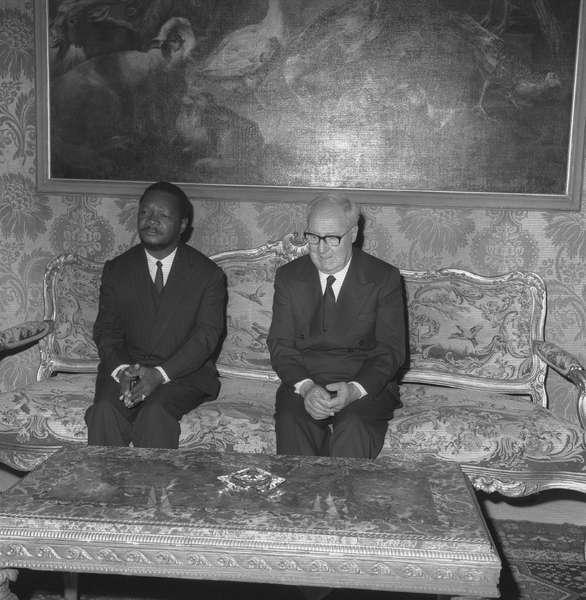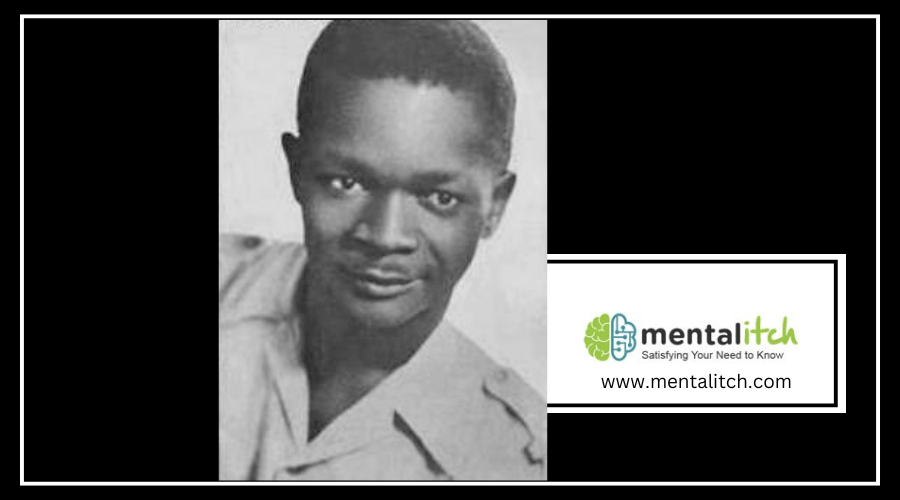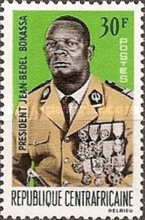In a move that would’ve made Caesar blink, Jean-Bédel Bokassa crowned himself Emperor of Central Africa in a spectacle that blurred the lines between ancient ceremony and modern ambition. You might wonder how a military man turned self-proclaimed monarch managed such a feat, transforming a republic into his personal empire with a coronation that rivaled those of history’s most opulent rulers. This audacious act wasn’t just about lavish displays; it was a calculated effort to etch his name on the world stage. But beneath the surface of this grandiose event lay a complex weave of power, politics, and personality that begs closer inspection.
What drove Bokassa to claim such a title, and how did the world react to this bold declaration? The answers to these questions offer a fascinating glimpse into the aspirations and downfall of one of history’s most controversial figures.
Early Life
Born on February 22, 1921, in Bobangui, French Equatorial Africa, Jean-Bédel Bokassa’s early years laid the groundwork for his controversial ascent to power. Growing up in a region under French colonial rule, Bokassa’s path was shaped by the turbulent times. His ambitious nature and keen interest in military affairs saw him joining the French army in 1939, where he quickly proved his mettle.
By 1961, you’d find Bokassa as a captain, a rank that attested to his dedication and skill in the military. His leadership abilities didn’t go unnoticed, and when the Central African Republic gained its independence, Bokassa left the French armed forces, ready to play a pivotal role in his country’s future. It wasn’t long before he saw an opportunity to seize power for himself.
In a bold move, Bokassa overthrew President David Dacko on December 31, 1965. The very next day, he declared himself president, marking the beginning of a new era for the Central African Republic. Bokassa’s early life, marked by ambition and a climb through the military ranks, set the stage for his eventual rise to power, a rise that would see him become a figure of both reverence and controversy.
Military Career

| Year | Milestone | Impact |
|---|---|---|
| 1939 | Joined the French Army | Began military career |
| 1961 | Rose to the rank of captain | Demonstrated leadership and military prowess |
| 1966 | Declared himself President | Changed from military leader to ruler |
His military background didn’t just provide him with the skills to lead; it also shaped his authoritarian approach to governance. Bokassa’s rule, characterized by strict control and a direct shift from a military leader to the head of state, was significantly influenced by his experiences in the French Army and his actions against President David Dacko. These experiences set the stage for his audacious self-coronation, highlighting the critical role that Bokassa’s military career played in his path to becoming Emperor of the Central African Empire.
Coup D’état
In a bold move that changed the course of the Central African Republic’s history, Jean-Bédel Bokassa staged a coup d’état on December 31, 1965, overthrowing President David Dacko. This wasn’t just any power grab; it was the moment Bokassa set his sights on transforming the nation under his autocratic rule. The very next day, he declared himself president, sending a clear signal that a new era had begun.
Here are a few key points to remember:
- Coup d’état: Bokassa’s strategic move not only toppled the existing government but also marked the start of his dominance in Central African politics.
- Autocratic leadership: Immediately assuming power, Bokassa began molding the country’s governance with a firm, autocratic hand.
- Foundation for empire: This coup laid the groundwork for Bokassa’s later self-coronation as Emperor, an audacious step that would forever alter the nation’s identity.
- Milestone: The coup d’état was important in Bokassa’s political journey, propelling him from a military background to the pinnacle of national leadership.
Bokassa’s coup was a clear illustration of his ambition and determination to rule, setting the stage for his eventual claim to imperial power.
Consolidating Power
How did Jean-Bédel Bokassa solidify his grip on power after the coup? After seizing control, he didn’t just stop at declaring himself the ruler; he went a step further by dissolving the existing government. In 1976, he made a bold move, transforming the Central African Republic into a monarchy and proclaiming himself Emperor Bokassa I. This wasn’t just about changing titles; it was a strategic play to cement his authority both domestically and internationally.
To leave no doubt about his imperial status, he organized a coronation ceremony in December 1977 that was nothing short of spectacular. Imagine the scene: a two-ton imperial throne and a crown that cost millions. This wasn’t just a ceremony; it was a statement.
| Strategy | Action | Impact |
|---|---|---|
| Government Dissolution | Declared a Monarchy in 1976 | Centralized Power |
| Self-Proclamation | Became Emperor Bokassa I | Established Authority |
| Coronation Ceremony | Blended African and European Customs | Showcased Imperial Status |
Bokassa’s coronation, with its lavish French-inspired regalia, aimed to project immense power. It wasn’t just about the opulence; it was a calculated attempt to blend traditions, ensuring his imperial title resonated far and wide.
Proclaiming the Empire
Jean-Bédel Bokassa declared himself Emperor of the Central African Empire in a bold move during December 1976, setting the stage for a lavish coronation that would leave the world in awe. The proclamation wasn’t just a statement but a prelude to an event that would embody grandeur and solidify his claim. On December 4, 1977, Bokassa staged a coronation ceremony that was nothing short of spectacular, drawing inspiration from Napoleon Bonaparte’s own coronation. This event was a blend of tradition and opulence, designed to showcase the might and splendor of the newly established empire.
Here’s what made the coronation ceremony a spectacle to behold:
- The ceremony was a unique blend of traditional African elements and European pomp, symbolizing the fusion of cultures.
- An opulent setting in a sports stadium in Bangui, transformed for the occasion, served as the backdrop.
- Bokassa crowned himself with a heavy gold crown, a bold assertion of his authority and status as Emperor.
- The event was secured with tight security measures, ensuring the day proceeded without a hitch.
This grand event was Bokassa’s way of declaring to the world the rise of the Central African Empire, marked by unparalleled grandeur.
Coronation Preparations
Reflecting on the grand spectacle of the coronation, let’s examine the meticulous preparations that set the stage for this historic event. Bokassa, inspired by Napoleon, went all out for his self-coronation on December 4, 1977, forming various committees to make sure nothing was left to chance. These committees were tasked with overseeing everything from accommodation to the city’s appearance and, importantly, the ceremonial costumes that would dazzle onlookers.
The French involvement cannot be understated, with President Giscard d’Estaing playing a pivotal role in the organization. This collaboration brought an air of legitimacy and extravagance to the proceedings. To bring Bokassa’s vision to life, foreign artists were hired, contributing to the opulence of the event.
Here’s a quick breakdown of the key elements in the preparations:
| Aspect | Description | Contribution to Ceremony |
|---|---|---|
| Committees Formed | Accommodation, City Appearance, Costumes | Ensured seamless organization |
| Ceremonial Costumes | Specially designed for the occasion | Added visual grandeur |
| Luxury Elements | Expensive regalia and decorations | Elevated the event’s lavishness |
| French Involvement | Provided assistance and legitimacy | Enhanced organizational capacity |
Each of these components played a pivotal role in setting the stage for a coronation that was nothing short of spectacular.
The Lavish Ceremony
On December 4, 1977, Bokassa’s coronation dazzled attendees with its blend of Napoleonic flair, Mozart’s melodies, and the rhythmic beat of tribal drums. You would have been among the 3,500 guests witnessing a spectacle designed to impress not just the local populace but the world. The Central African Empire, under the gaze of Imperial Majesty Bokassa, sought to carve its grandeur in history with a ceremony that was as much about political ambition as it was about personal vanity.
- Bokassa crowned himself, placing a heavy gold crown on his own head, symbolizing his ultimate authority.
- The grand entrance was made in a green and gold coach drawn by eight pale gray horses from Normandy, a scene straight out of a fairy tale but set on the edge of the African jungle.
- Decorated with bunting and flags, the sports stadium in Bangui transformed into a theatrical stage for a day, blurring the lines between royalty and the world of dreams.
- The French government, despite its complicated relationship with Bokassa, observed as the Central African Empire sought to establish a lavish and regal image, blending traditional African elements with the opulence of European monarchies.
Reign and Repression
Following his self-crowning, Bokassa’s reign quickly descended into authoritarianism, marked by severe human rights abuses and the lavish yet oppressive exercise of power. You’d find his rule characterized by authoritarian rule at every turn, where opposition wasn’t just unwelcome; it was met with brutal force. His regime didn’t shy away from extravagant displays of power, often at the expense of the nation’s resources and to the detriment of its people.
Amidst the opulence, Bokassa’s government was notorious for its human rights abuses. Dissenters faced violent crackdowns, and the international community condemned these actions, yet he remained undeterred. His thirst for power and control only grew, showcasing an insatiable desire to assert his dominance through fear and flaunting his authority without regard for the consequences.
Despite the allure of grandeur that Bokassa attempted to project, the reality of his reign was a stark contrast, filled with repression and suffering. His extravagant lifestyle, funded by the state’s coffers, didn’t mask the pervasive abuses that plagued his rule. As a ruler, Bokassa’s legacy is a cautionary tale of how absolute power can corrupt absolutely, leaving a nation to grapple with the consequences.
Overthrow and Aftermath
As Bokassa’s reign of terror and opulence came to a halt, French paratroopers orchestrated his overthrow in September 1979. You’re witnessing the end of an era marked by extravagance and brutality, a moment when the tides of history turned. Following his dramatic ousting, Bokassa didn’t immediately face the music for his actions. Instead, he found refuge in exile, moving first to Côte d’Ivoire and then settling in France, far from the turmoil of the Central African Republic he once ruled with an iron fist.
- French paratroopers played a pivotal role in ending Bokassa’s reign, marking a significant external intervention in the Central African Republic.
- Bokassa’s life in exile saw him moving from Côte d’Ivoire to France, a stark contrast to his previous lavish lifestyle.
- Despite being sentenced to death in absentia in 1980, Bokassa’s story didn’t end there. He boldly returned to the Central African Republic in 1986, only to be arrested and found guilty of numerous crimes.
- Remarkably, despite his sentence to death in 1987, Bokassa was eventually freed in 1993, showcasing a dramatic turn in his fortunes.
Conclusion
In the end, Jean-Bédel Bokassa’s dramatic self-coronation as Emperor couldn’t solidify his legacy or guarantee his power. Despite the extravagant ceremony, his reign was marked by repression and excess, leading to his downfall in less than two years. After being overthrown, Bokassa’s dream of a grand empire crumbled, leaving a controversial legacy and a nation aiming to move past his turbulent rule.
His story serves as a stark reminder of the perils of absolute power and self-aggrandizement.

